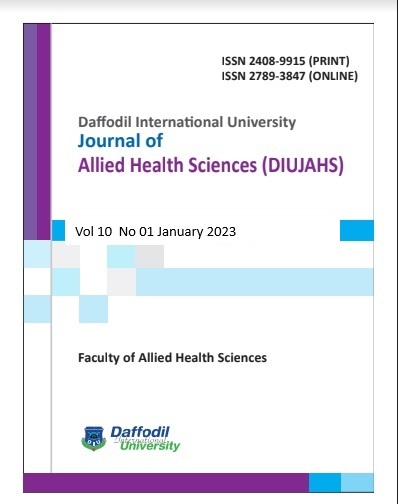PREVALENCE OF FAMILY PLANNING METHOD USE AMONG MARRIED WOMEN AND ITS ASSOCIATION WITH PHYSICAL HEALTH IN URBAN AREAS OF BANGLADESH
DOI:
https://doi.org/10.36481/diujhss.v10i1.mww1py26Keywords:
Family planning method,, Married women,, Physical health,, Public Health,Abstract
Family planning (FP) is essential for improving women's health and well-being by preventing unintended pregnancies, reducing maternal and infant mortality, and promoting sustainable development. However, many married women in Bangladesh do not use FP methods, and there is limited research on the association between FP method use and physical health among urban women in the country. This cross-sectional study was conducted among 370 married women attending primary health care centers in Dhaka, Bangladesh, from September to December 2022. Systematic random sampling was used to select participants. Data were collected through face-to- face interviews using a semi-structured questionnaire, and statistical analyses were performed using SPSS version 22. Pearson’s chi-square test was used to assess associations between FP method use and various socio- demographic and physical health factors, with a significance level of p < 0.05. Among the participants, 33.2% used oral contraceptive pills, 20.3% used injectable methods, and 11.1% used condoms, while 29% did not use any FP methods. Significant associations were found between FP method use and age (χ2 = 32.61, p = 0.00), with women aged 26-40 showing the highest usage (43.5%). Monthly income (χ2 = 13.06, p = 0.00), physical activity levels (χ2\ = 12.59, p = 0.00), menstrual cycle regularity (χ2 = 29.03, p = 0.00), weight changes (χ2 = 13.46, p = 0.01),
anorexia (χ2 = 6.59, p = 0.04), and general weakness (χ2 = 7.55, p = 0.00) were also significantly associated with FP method use. This study highlights that age, income, physical activity, menstrual cycle regularity, and physical health conditions such as weight changes, anorexia, and general weakness are key factors influencing FP method use among married women in urban Bangladesh. These findings underscore the need for targeted public health interventions and education to improve FP uptake and address the associated health impacts on women. Further research is recommended to explore these relationships on a larger scale.

